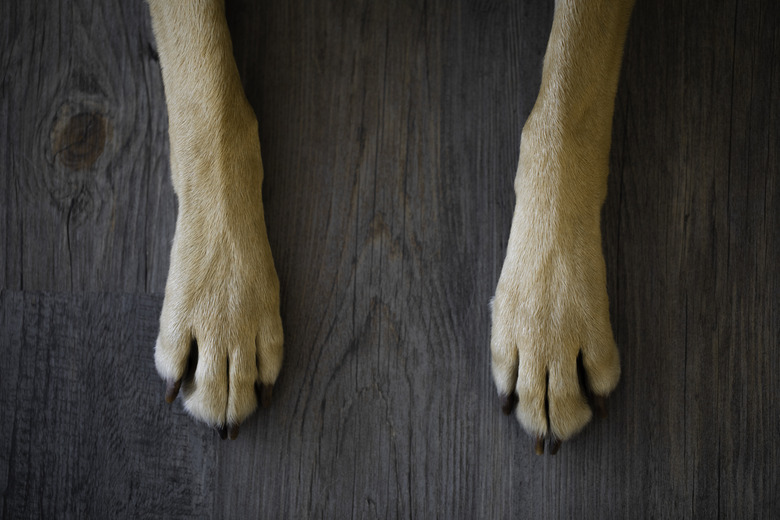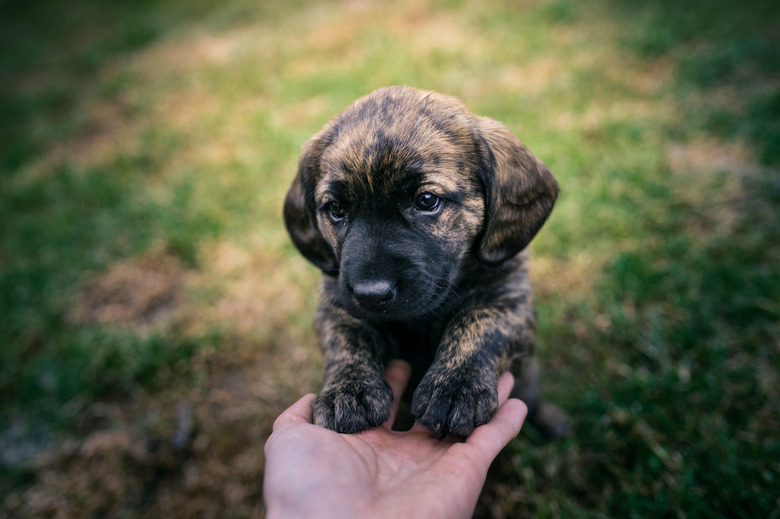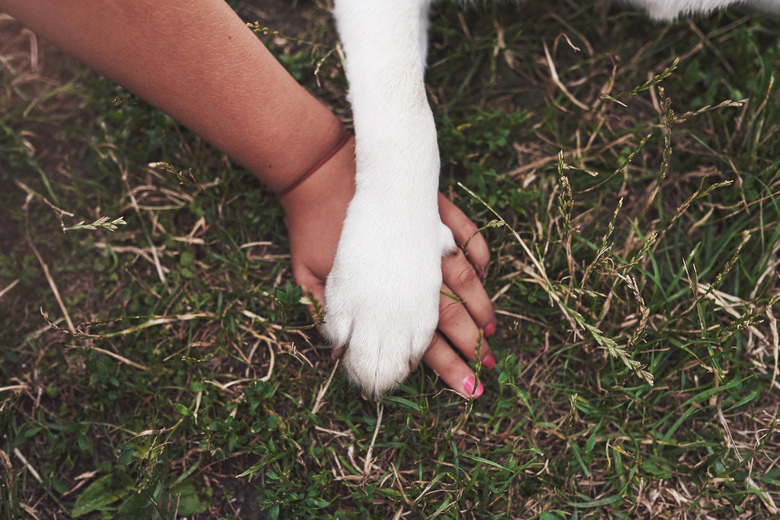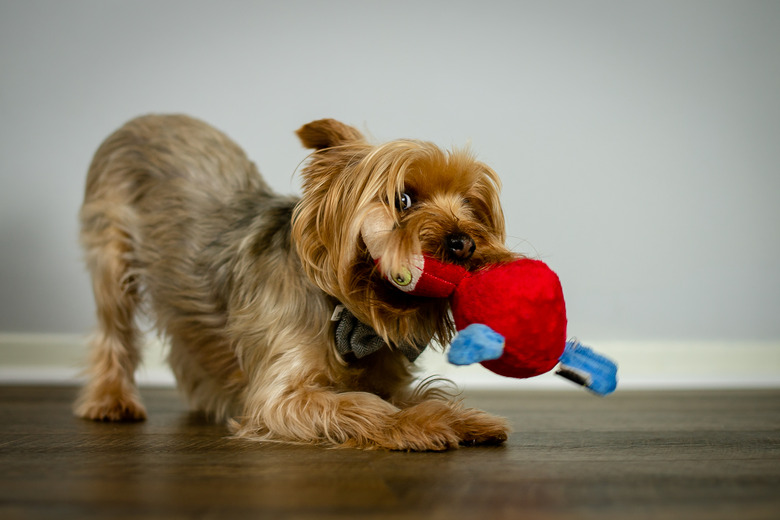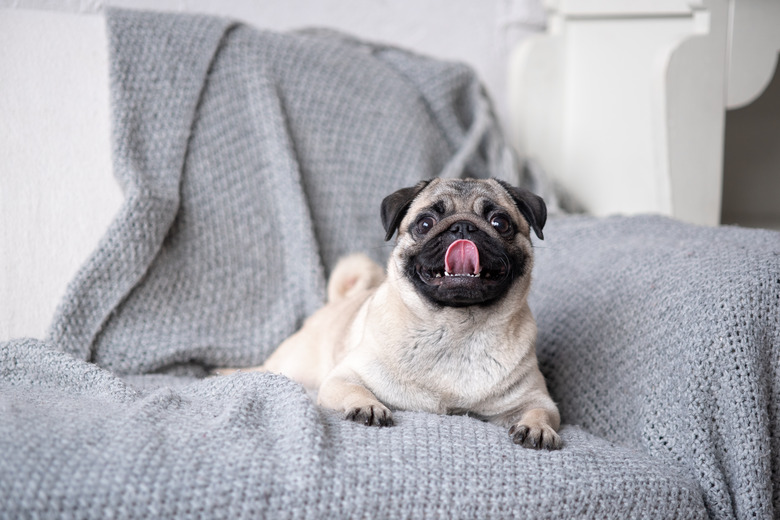Why Do Dogs Chew Their Feet?
There is nothing dogs love more than to dine on their adorable paws. Paw licking and chewing their own feet is a common dog behavior in canines, and it's mostly nothing to worry about. Dogs chew their feet to clean and remove debris from their fur.
However, dogs should only gnaw on their paws during a bathing routine. If you see them chewing for other reasons or if they've suddenly started compulsively chewing their paws, then it's time for dog owners to investigate the underlying cause. There are a variety of reasons dogs engage in this behavior.
Dog allergies can cause paw chewing
Dog allergies can cause paw chewing
Irritation from allergies is the most common reason a dog chews their paws and paw pads. Allergies are typically caused by food. But like their humans, dogs are also sensitive to pollens and lawn chemicals that are often transmitted to paws by way of grass or undergrowth. If your dog is showing signs of allergies and there is not a seasonal shift in pollen or outdoor activity, then a food allergy is the most likely culprit. However, sometimes dogs are exposed to allergens from new brands of shampoos, soaps, household cleaners, or other environmental allergens — which can trigger a dog's skin allergy.
Dogs chew dry skin
Dogs chew dry skin
If you've ruled out the likelihood of allergens, then dry skin may be the cause of your puppy chewing their paws. Dogs naturally produce oils that protect and hydrate their skin and coat. Atmospheric shifts in the weather, hot temperatures, and medical conditions can all cause dogs to soothe irritations with their mouths.
Try relieving your dog's dry skin with coconut oil or these natural home remedies to alleviate dryness.
Flaky skin can also be caused by fleas. Most dogs have minor allergic reactions from the saliva injected into their skin from flea bites. Veterinarians can provide medication to eradicate flea infestations, but there are also over-the-counter solutions and alternative home remedies.
Over-grooming can also cause dogs to have dry skin. When bathed too frequently, especially with products not formulated for canines, a dog's skin and coat is depleted of the oils that nourish and hydrate them. This can lead to dogs chomping on their paws for comfort.
Pain or discomfort causes irritation
Pain or discomfort causes irritation
Dogs often gnaw at their feet in response to pain or discomfort. Because their paws are in constant contact with the ground, there are many ways dogs can injure their feet. Puncture wounds from yard debris, broken claws and foreign objects lodged between toes are all common causes of paw pain.
Sometimes dogs chew their paws to soften internal sources of pain too. If the unexplained paw chewing is accompanied by a limp, then your dog may be suffering from health issues such as hip dysplasia, joint pain, or arthritis.
Parasites lead to paw chewing
Parasites lead to paw chewing
Ticks, mites, and fleas can all cause dogs itchiness and distress when their coats become infested. Ticks and fleas are larger and fairly easy to spot, but you may need the assistance of a veterinarian to confirm the presence of mites.
Anxiety can provoke a compulsive behavioral issue
Anxiety can provoke a compulsive behavioral issue
A dog who compulsively chews and licks their paws is often displaying symptoms of separation anxiety. Even for dogs who do not suffer from separation anxiety, compulsive chewing is often a sign of depression, stress, or sadness.
If you suspect stress or anxiety is causing your dog to chew their paws, there are a number of stress home remedies to experiment with, including this DIY anxiety wrap.
Mange may be responsible for a dog chewing their paws
Mange may be responsible for a dog chewing their paws
Sarcoptic mange can cause dogs an unbearable soreness that chewing will most likely not mollify. If your dog is chewing their feet, elbows, belly, and nearly every other region of the body, then mange may be the culprit.
Boredom
Boredom
Sometimes your dog may be chewing their paws because they like the feeling. If your dog is chewing their paws more frequently than usual and you have ruled out other possible causes, it could be that chewing is their latest hobby.
How to help your dog stop chewing their feet
How to help your dog stop chewing their feet
Follow these several helpful tips to help determine the cause and treatment for paw chewing.
Correct any medical issues first
When concerned that your dog is excessively chewing their feet, a visit to the veterinarian is in order after you've ruled out paw injuries, anxiety, or boredom. Your vet can assist you in diagnosing the problem and provide your loved one with a course of treatment.
If you're unsure whether a consultation with your vet is warranted, here are a few preventative actions to take first:
- Wash dogs with shampoo or soap formulated to remove parasites or treat their coats with a powder or spray that does a similar job.
- Avoid chemical allergies by not allowing dogs access to areas of the home or yard that contain any traces of pesticides, fertilizers, lawn-care products or household cleaners.
- Avoid food allergies by not allowing dogs to eat table scraps and providing them with high-quality dog food.
Treat dry skin
If dryness is the culprit behind your dog's paw chewing, you have a variety of hydration methods to soothe their irritated skin.
- Treat your dog to an oatmeal bath to relieve inflammation, and itchy, dry skin.
- Take luxury to the next level with this doggy Aveeno spa treatment.
- Cuteness' health section has more solutions for your scratchy dog, including this step-by-step tutorial to moisten dry skin on dogs' paws.
Redirect your dog's attention
Dogs get bored; so give them something to do by redirecting their attention away from their hot spots — highly entertaining paws.
- Give your dog one of these 17 jobs or activities to distract them from chewing their paws.
- Begin an at-home training program to teach them some productive and useful commands.
- Try giving them a toy to chew instead. Any of these recommended toys will keep bored dogs super busy.
Calm separation anxiety
Dogs experience anxiety in a manner similar to humans, and it often manifests in the form of compulsive behaviors. Paw chewing is one of many behaviors dogs engage in to communicate how they feel. Often, dogs chew their paws when they are worried. They may be worried that their pet parent is going to leave, or it could simply be general nervousness about loud noises. Dogs pick up on the subtle cues of their owners and express their concern when they anticipate a traumatic action or event.
Here are a few tips to help your dog overcome their anxiety and paw chewing:
- Dietary changes have been shown to help some dogs adjust to stressful situations.
- Calming pheromone products can be a useful tool in addition to other anxiety-reducing methods.
- If all else fails, try this 4-step plan to diagnose and treat anxiety.
When to seek veterinary care for a dog chewing their paws
When to seek veterinary care for a dog chewing their paws
For the most part, paw chewing can be corrected at home. Any serious medical condition would present with other symptoms impacting a dog's health. This can present as a limp, chewing other parts of the body or bacterial infection. But if your dog is simply chewing their feet a normal amount or slightly more than usual, chances are good that you can correct the behavior with toys, training, nutrition, or bathing.
